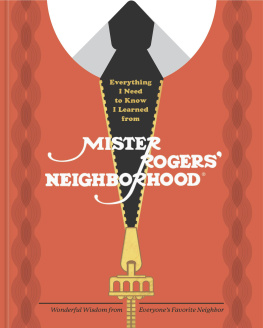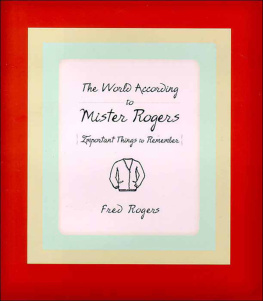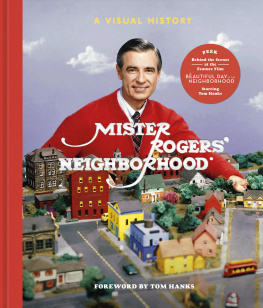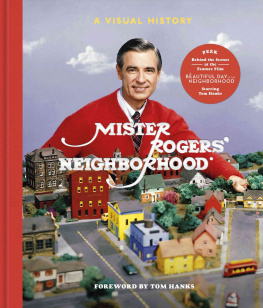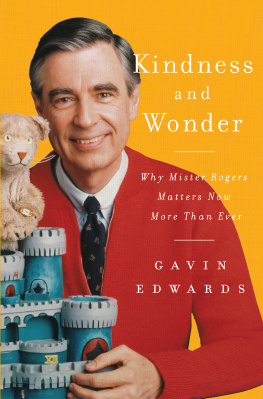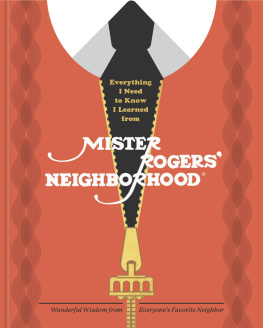LifeCaps Presents:
Mister Rogers
A Biography of the Wonderful Life of FredRogers
By Jennifer Warner

By BookCaps Study Guides
2011 by Golgotha Press,Inc.
Published at SmashWords
About LifeCaps
LifeCaps is an imprint ofBookCaps Study Guides. With each book, a lesser known or sometimesforgotten life is recapped. We publish a wide array of topics (frombaseball and music to literature and philosophy), so check ourgrowing catalogue regularly ( www.bookcaps.com ) to seeour newest books.
Introduction
Fred Rogers was one of the most belovedchildren's television hosts during the 1960's through the 1990's.He was most famous for his show, Mister Rogers Neighborhood, wherehe talked to children directly through the television in histrademark slow manner of speech and zippered cardigans.
The compassionate persona he emitted throughthe television was not an act, as Fred Rogers the person deeplycared about children and their education. He viewed television asnot mere entertainment, but as a tool for self-reflection as wellas a means of real communication. His genuine way of communicatingwith not only children, but also adults, touched the hearts ofeveryone he met, and his legacy of kindness has since been passedon by those who knew him.
Chapter1: Childhood and Education
Family and EarlyYears
Frederick Rogers was born on March 28, 1928 to James andNancy Rogers at his grandparents house in Latrobe, Pennsylvania. His motherwas the only child of Fred McFeely, who later became Fred's closestrelative.
Hisparents were intenselyreligious, and Fred grew up highly influenced by the Christianfaith. His father worked at the family brick company and taughtFred Rogers his valuable work ethic. The company was called theMcFeely Brick Company, and was started by Fred's grandfather.Eventually, James Rogers bought the company and took over theleadership responsibilities for the elderMcFeely .
Hismother, Nancy, frequently volunteered at the hospital as anurse's aide and lovedtaking care of people. Both his mother and father were well knownand well-loved in the town. Fred had many memories of his mother'scaring nature, including watching her take care of World War IItroops and making everyone in their family hand knit sweaters everyChristmas. Because of his mother, Fred developed a fondness forsweaters and always requested a zippered one for the next year.These were the same sweaters that he eventually became known forwearing on Mister Rogers Neighbourhood, and, according to hisinterview with Karen Herman, until his mother died every singlesweater he wore on the show was hand knit by her.
He grewup in Pittsburgh with a particularly large family but was especially close to hisgrandparents during his childhood years. He spent long days withhis grandfather, who allowed him to roam, play and express himselffreely in a way that had an impact on Fred Rogers even when hebecame older. In his interview for Emmy TV Legends, he recalls onememory in which his grandfather told him that he made his daybetter just by being himself. This, of course, made Fred feel trulyspecial and loved. When he became older, he still remembered thatfeeling and made it his mission in life to pass it on toothers.
WhenFred was eleven, his parents adopted a six month old baby girl whomthey named Elaine, and Fred became an older brother. He tremendously enjoyed having asibling, and Elaine turned out to be quite a mischief maker. It wasrumoured that one of the puppets on his television show, MisterRogers Neighbourhood, was named after Elaine.
Hobbies andInterests
As a child,Fred had a lot of trouble expressing his feelings. He often feltisolated from other children, and sometimes even adults. He gotsick often, and was made fun of for being overweight. His shy andquiet nature didn't help him connect with other children, and whenhe expressed his frustration to the adults in his family theyadvised him to ignore the negative feelings. This hurt Fred andonly served to make him more confused. As a television host, hetried to get across to parents and children that ignoring feelingsnever solved any problems and that children needed to find a way toget those feelings out.
Theoutlet that Fred eventually found for his frustration and othernegative feelings was the piano. As a remarkably young child, it was his mother whoplayed the piano for him, but by the age of five he began to beable to play himself. He showed great promise as a musician andenjoyed playing the piano for others, as well as putting on puppetshows. Because it was hard for him as a child to put his oftenconfusing and muddled feelings into words, the piano allowed him toexpress himself in a way that didn't hurt anyone else. As an adult,he tried to pass on that knowledge to other children. He emphasized that it didn't have to be the piano, but could be any formof artistic expression from music to art or acting.
It was hisgrandmother who gave him his first piano, a twenty five dollar pumporgan that he played on all the time as a child. In his interview,he recalls that the only time when he felt like he was his trueself was when he was playing music. He did, however, have otherhobbies besides the piano and his passion for music. He was alsoobsessed with photography, a hobby that he entertained until theend of his life. As a child, he would often go down to the basementdark room and develop his pictures himself. When he got older, hehad his photographs developed elsewhere. Unlike many photographers,Fred was not interested in capturing landscapes or objects, butrather people. He loved nothing more than to photograph theexpressions on people's faces.
Religion
Fred wasborn into a deeply religious family, and his mother and fatherwere hugely involved inthe church when he was growing up. The family attended the FirstPresbyterian Church of Latrobe every week and even as a young childFred was seriously engaged by the whole experience. He lovedlistening to the sermons, even when others were bored, and felt asthough religion touched something in him. Religion helped shapedFred's view that every individual has a unique and perfect purposein life, no matter their situation, and helped him pursue a life ofkindness and generosity.
This also mayhave had something to do with his father, who was a generous personand believed that the church should always give back to thecommunity more than it received. Fred grew up learning thisvaluable lesson, and spent the rest of his life giving back, tochildren and adults alike, through the medium of television.
High School
Fred'sshyness and lack of confidence , despite his loving family andchurch support , followed him into his high school years. He feltisolated from others his age, and this isolation caused him toshrink back in school. Several unlikely friendships, however,during these years , forever changed Fred's relationship withhimself and others.
One of thesefriendships was with a popular, talented athlete named JimStumbaugh. During school, Fred never dreamed that he and Jim wouldever be the type to become friends. One day, however, Jim wasinjured during a game and had to spend an extended time in thehospital. Fred was assigned the task of delivering Jim's homeworkto him, taking notes for him during class, and making sure he hadall the books he needed to keep up while he was bedridden.
Throughout Jim's hospital stay, he and Fred got to knoweach other. Fred could see past Jim's popular sports guy exterior,and Jim appreciated Fred for his quiet and kind nature. The twobecame remarkably closefriends, and continued their friendship even after Jim was releasedfrom the hospital and allowed to go back to school. It was thefirst time that it was possible for someone his age to take thetime to learn about the depth of Fred's personality, and allowhimself to be known by Fred in return.
Next page






